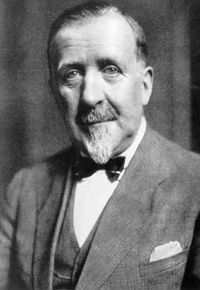
He was born in Lübeck on March 27, 1871 in a merchant family (his father was a successful grain merchant and served as a senator), in which the old patriarchal traditions reigned. Despite the fact that there were five children, the family lived richly, the childhood years of the future writer were not overshadowed by any worries and worries.
After graduating from the gymnasium in 1899, Heinrich Mann came to Dresden, worked for some time in the field of book sales. His next place of residence is Berlin. In this city, he was an employee of a publishing house and a student at the Friedrich Wilhelm University of Berlin. In 1891, the father of the family died of cancer, after which the family moved to Munich in 1893, where Heinrich constantly visited his mother, brothers and sisters.
The path of Heinrich Mann as a writer begins in 1900 with the novel "The Promised Land", warmly received by readers. In 1903, the trilogy "Goddesses" was published, in which the author is still far from the position of realism. In his early work, the influence of classical and modernism can be traced, forming a bizarre combination. The realistic beginning is noticeably strengthened in the novel "Teacher Gnus" (1905).
The beginning of the 10s becomes the starting point for Mann's work as a literary critic and publicist. In 1914, just a month before the outbreak of the First World War, Mann completed one of his most significant works - the novel "Loyal Subject". In 1915, it was published in Russia, at home; readers saw it only after 3 years. Published in 1925, the novels "The Poor" and "The Head" turned "Loyal Subject" into the first part of a trilogy called "Empire". He held the title of academician of the Department of Literature of the Prussian Academy of Arts, and became chairman of the same department in 1931.
Since 1933, the biography of Heinrich Mann begins the period of emigration associated with the coming to power of A. Hitler. The name of the writer appeared in the first list of persons who were deprived of German citizenship. His new place of residence was Prague, and then he lived in Nice, France, in Paris. In the capital from 1936, he served as chairman of the Committee of the German Popular Front. In 1940, Mann moved to Los Angeles, USA.
During the years of emigration, a change in his worldview occurs: Mann comes to the conclusion that the bourgeois republic is not able to give the people a true democracy, and turns to the socialist ideology. Communication with representatives of the KKE in the framework of the anti-fascist struggle helps him to take a fresh look at the historical role of the proletariat, to stand on the position of militant humanism.
Written during this period, "The Youth of Henry IV"(1935) and "The Maturity of Henry IV" (1938) are recognized as the highest creative achievement of the later period of his literary activity. In 1946, the book "Review of the Century" was published, in which the genre of autobiography is combined with memoirs and political chronicles. After the war, the writer actively contacted the GDR; he was elected the first president of the German Academy of Arts established in Berlin. Mann intended to move there, but his death found him in a foreign country on March 11, 1950, in the city of Santa Monica (California, USA).
Nazira Artykbayeva, librarian of the International Book Department

